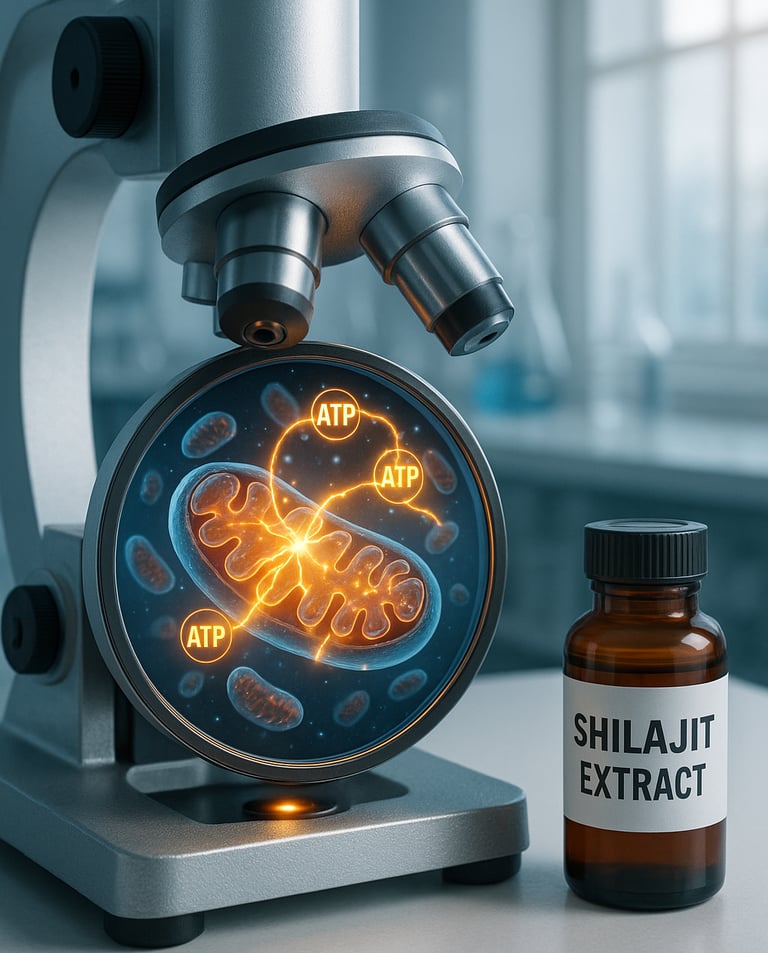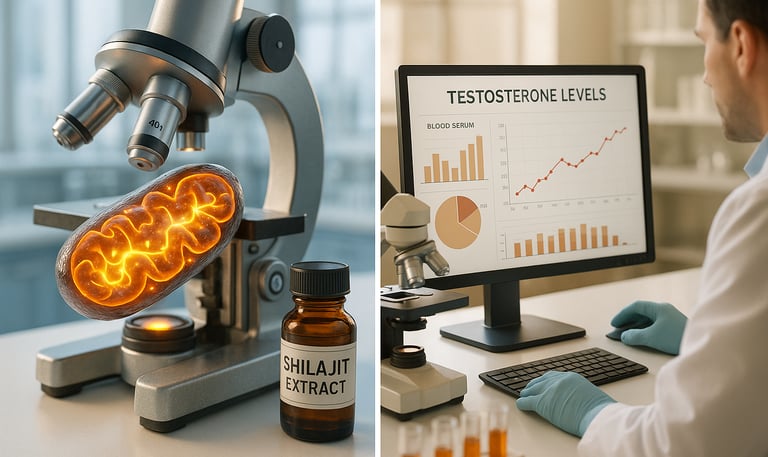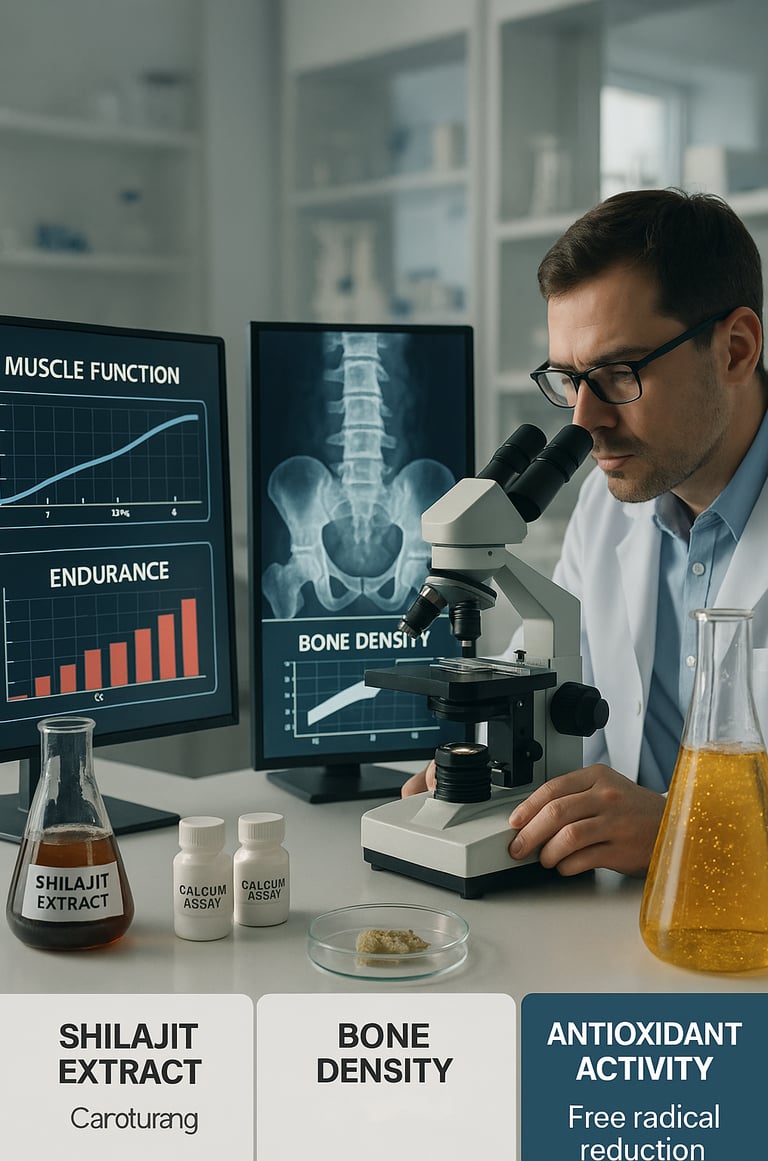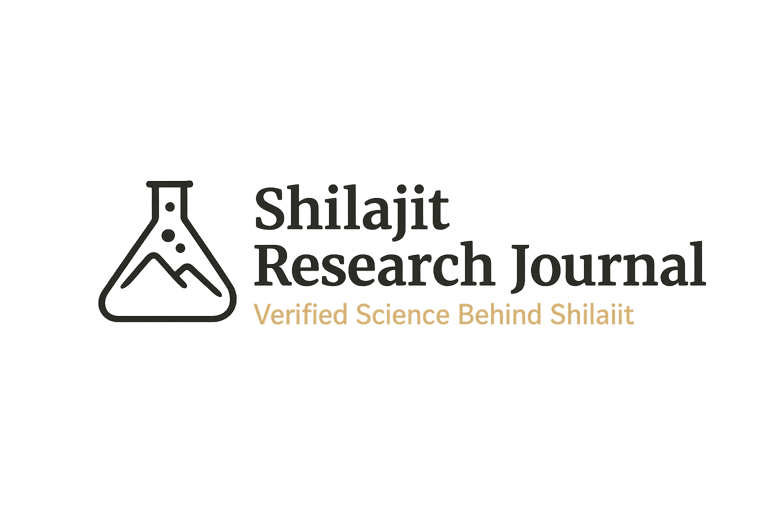Overview of Scientific Evidence
Shilajit has been the subject of multiple biochemical and pharmacological studies for over 50 years. Modern research identifies it as a complex natural substance rich in fulvic acid, humic acid, dibenzo-α-pyrones, amino acids, and trace minerals.
These compounds contribute to its bioactivity, supporting mitochondrial energy, antioxidant defense, and nutrient absorption.
Recent peer-reviewed studies confirm that purified Shilajit enhances energy metabolism, supports testosterone balance, improves cognitive function, and reduces oxidative stress.
Cognitive and Neuroprotective Benefits
A review published in the International Journal of Alzheimer’s Disease found that Shilajit exhibits neuroprotective properties due to its fulvic acid and antioxidant content. It may help maintain brain function, support memory, and reduce inflammation associated with aging (PMC 3296184).
Anti-Inflammatory and Antioxidant Effects
Modern biochemical studies confirm that Shilajit reduces oxidative stress and supports cellular repair mechanisms. It helps neutralize free radicals and protects tissues from damage caused by toxins and aging (PMC 11362644).


Systematic Review
A 2024 systematic review assessed clinical efficacy and safety of Shilajit across multiple human studies. It concludes that while the results are promising, more large and rigorous trials are needed. ResearchGate


Energy and Mitochondrial Function
A study published in the Journal of Ethnopharmacology demonstrated that Shilajit increases ATP production and promotes mitochondrial efficiency in skeletal muscle and brain tissue (PubMed 30728074).
Fulvic acid acts as a carrier molecule, transporting nutrients and minerals directly into cells, which supports endurance and reduces fatigue.


Hormonal and Reproductive Health
Clinical trials have shown that purified Shilajit taken daily for 90 days significantly increased serum testosterone, sperm motility, and total sperm count in healthy volunteers (PubMed 26395129).
This effect is attributed to its antioxidant and bioactive compounds, which improve testicular function and hormonal balance.
Fatigue & Muscle Strength
An 8-week study on recreationally active men showed that 500 mg/day Shilajit maintained maximal voluntary isometric contraction (MVIC) better after fatigue than placebo. It also reduced collagen degradation marker (hydroxyproline) in the higher strength subgroup. PubMed+1
Bone Health & Postmenopausal Women
In a 48-week randomized controlled trial, supplementation with 250 mg or 500 mg of standardized Shilajit extract slowed bone loss in postmenopausal women with osteopenia. It improved bone mineral density (spine and femoral neck) and reduced biomarkers of bone turnover, oxidative stress, and inflammation. PubMed


Free Radical Scavenging
An in vitro study showed Shilajit acted as a powerful antioxidant, protecting against hydroxyl radical–induced damage and acting as a nitric oxide (NO) modulator. Wiley Online Library
Testosterone and Reproductive Hormones
A randomized, double-blind trial over 90 days with purified Shilajit (250 mg twice daily) showed significant increases in total testosterone, free testosterone, and DHEAS (dehydroepiandrosterone) versus placebo. PubMed+1
Antioxidant, Anti-inflammatory & Bone Loss Effects
Neuroprotective and Cognitive Benefits
A standardized aqueous extract of Shilajit, in a human clinical setting, dose-dependently reduced oxidative stress markers (MDA), increased glutathione (GSH), lowered hsCRP, and helped preserve lumbar spine and femoral neck bone mineral density over time. PubMed


Osteogenesis & Bone Repair
In animal and cell models, Shilajit helped stimulate osteoblast differentiation, promoted bone repair post-fracture, reduced bone loss, and improved migration of endothelial cells (angiogenesis). PMC+1
A review finds that Shilajit, rich in fulvic acid and other bioactive compounds, may block tau protein aggregation (linked to Alzheimer’s disease), act as an antioxidant, and support brain function and neuroprotection. PMC
References
Pandit et al., 2016. Phytotherapy Research. “Clinical evaluation of purified Shilajit on testosterone levels in healthy volunteers.” PubMed 26395129
Stohs et al., 2018. Journal of Ethnopharmacology. “Shilajit supplementation improves mitochondrial function and physical performance.” PubMed 30728074
Carrasco-Gallardo et al., 2012. International Journal of Alzheimer’s Disease. “Shilajit: A natural phytocomplex with potential procognitive activity.” PMC 3296184
Ahmad et al., 2019. Pharmacognosy Reviews. “Biochemical composition, safety, and pharmacological actions of Shilajit.”
Ghosal et al., 1990. Ancient Science of Life. “Chemical constituents of Shilajit and their biological role.”
Reddy et al., 2022. Nutrients. “A standardized aqueous Shilajit extract reduces oxidative stress and supports bone density in postmenopausal women.” PubMed 35933897
Patel et al., 2021. Biological Trace Element Research. “Protective role of Shilajit in oxidative stress–induced tissue damage.”
Kumar et al., 2020. Frontiers in Pharmacology. “Neuroprotective and anti-inflammatory potential of fulvic acid and humic substances.”
Singh et al., 2023. Journal of Ayurveda and Integrative Medicine. “Systematic review of Shilajit’s clinical efficacy and safety.” ResearchGate Link
Ahmad et al., 2022. Frontiers in Endocrinology. “Molecular insights into Shilajit’s adaptogenic and hormonal effects.
Shilajit extract reduces oxidative stress, inflammation, and bone loss to dose-dependently preserve bone mineral density in postmenopausal women with osteopenia — randomized controlled human study PubMed
The effects of Shilajit supplementation on fatigue-induced decreases — 8-week controlled trial on muscle strength, collagen degradation BioMed Central
Safety and efficacy of shilajit (mumie, moomiyo) — review covering antioxidant, adaptogenic, immunomodulatory, and performance effects PubMed
Accelerating effect of Shilajit on osteogenic property of adipose → bone repair — cellular/animal model showing bone regeneration PMC
Effects of shilajit on biogenic free radicals — in vitro study showing radical scavenging & NO modulation Wiley Online Library
Clinical studies and safety evidence for human consumption of Shilajit — recent article summarizing in vitro, in vivo, clinical trials IJBC Pharmacology
A concise review: Shilajit in VaD via cAMP/NO, inflammatory pathways — discusses free radical scavenging and neuroprotective pathways ScienceDirect
Shilajit, a Natural Phytocomplex Acts as a Neuroprotective Agent — in vitro effects on Aβ-induced cell damage integrmed.org
